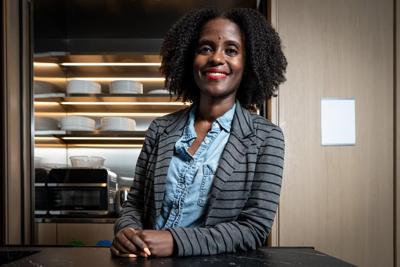VANCOUVER - Governments and corporations in Canada spend billions each year procuring products and services, but Jackee Kasandy says that historically barely any has gone to businesses owned by Black people, and she wants that to change.
Kasandy heads the British Columbia-based Black Entrepreneurs and Businesses of Canada Society, which now offers a certification program for Black-owned businesses to help owners navigate the lucrative but complicated world of government and corporate procurement.
The program is being run in partnership with Public Services and Procurement Canada.
"We know that the government buys just absolutely everything," she said in an interview. "So it's great to do business with the government and supply to the government."
She said when she discovered "almost zero" government procurement contracts were going to Black-owned businesses, her organization set out to find out why.
"We found out that there was a huge knowledge gap (among businesses). They didn't know that this opportunity existed, they didn't even know how to go about it," Kasandy said.
With many governments and corporations committing to supplier diversity initiatives, including earmarking a certain percentage for Indigenous-owned businesses, the society started the Black Business Certification Program, and its first cohort of participants has just completed the 12- to 14-week program.
Al White, who owns Toronto-based cybersecurity firm WRI Canada, was one of the first 20 entrepreneurs to go through the program.
Before going through the program, which the society says is the first of its kind in Canada, White said he considered the federal government and large companies as "unwieldy organizations" that would require an onerous amount of paperwork to work with a small-business owner like him.
He said online meetups for the certification program "very quickly became the highlight of my week," featuring guest speakers and people in government procurement positions who helped explain their processes, "which proved to be, you know, priceless."
"So for small-business people like me, there is now a renewed interest in doing business with the federal government," White said.
White said he didn't initially feel like he had much in common with others in the program because of the variety of businesses they were in, but that soon changed.
"Within a few weeks, I realized that we're all in it for the same reason. All we want is an opportunity to get to the table and talk to the necessary people who would either make the decision or influence the decision. None of us are looking for handouts," White said. "All we want to do is level the playing field, and if we get a chance to sit down with these people, where doors had previously been closed, we'll take our chances on being able to prove our value."
Asha Wheeldon, the founder of B.C.-based Kula Foods, said going through the certification program helped her assess her company's capabilities while demystifying the systems governments and corporations use for procurement.
"Oftentimes when you're small business and you have all these criteria of things that you need to do, it doesn't get done in a timely manner because it can be overwhelming," she said.
Wheeldon said a barrier she's come up against is identifying the right people ã the decision-makers who award procurement contracts.
"Having that access to decision-makers, buyers and the staff that are involved in this process who shared their knowledge was very helpful," she said.
Kasandy said the program aims to give Black-owned businesses a leg-up in navigating government and corporate procurement as organizations commit to improving supplier diversity.
"Government has done an amazing thing with Indigenous groups, where they've dedicated five per cent of contracts to go to Indigenous organizations," she said.
"My ideal world would be that there's another three or five per cent for other diverse businesses.
"It would be nice if the government did that, but that's a big system change that we're hoping will become true in the future, but for now, what we needed to do was provide the training that was required for these entrepreneurs to be able to engage in this business."
This report by üСÜꪤüýò¿Øéóæòêü was first published May 29, 2024.








































